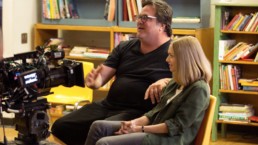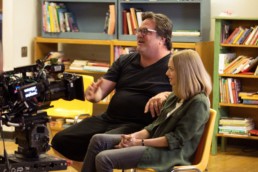‘The Last Word’ Director Mark Pellington on Insecurity and Taking Risks
“Everyone wants some sense of approval. A filmmaker or actor isn't any different.”
Director of “The Last Word,” Mark Pellington, has made a name for himself with thrillers like “Arlington Road” and “The Motorman Prophesies,” and popular music videos for some of the industry’s most talented artists, including Michael Jackson, U2, Demi Lovato, and Moby.
In his latest work, Pellington takes on an emotionally-packed comedy starring Hollywood legend, Shirley MacLaine. With such a character at the forefront of the film, it’s easy to look past the challenges of insecurity and instead focus on the militant and self-assured lead, but Pellington uses these emotions to expose the same fears and vulnerability familiar to us all.
For our review of “The Last Word,” click here.
How did the idea for this story come about? What was the process of getting started?
Stuart Fink—the writer—came to me a few years ago, we were doing a commercial, I want to say about 3 and a half years ago—and he told me he had an idea about a woman who wanted to write her own obituary. He wrote it and we developed the script, and eventually reached out to get Shirley MacLaine in it. In traditional Hollywood terms: idea, develop the script internally, get actor attracted to trigger, financing. Fairly standard.
What was the moment when you realized the script was ready to be shown to other people?
You do versions with a writer and at a certain point, as a director who is also a producer, there’s a certain place where I can’t take it any further. Somebody could say ‘Oh, but you should add this scene…or what about this,’ but everyone reaches their limit. I think I showed it to three or four people that I trusted in the business whose job it is to look at something on a level of like ‘Do you think this can get made’ meaning ‘Do you think it’s ready for actors to read,’ and then I’ll support it. At that point it’s like, alright let’s go, let’s see.
And what was Shirley MacLaine’s reaction when she first read the script?
She liked it. Stuart had written it kind of for her, not specifically every line, but he definitely goes, ‘I wrote this with Shirley in mind.’ To get offered a lead in a movie that’s about you is great. She loved it and the character.
You want to tell the story honestly. You want every day to surprise you a little bit.

What was your main goal throughout the process of making the film?
You want to tell the story honestly. You want every day to surprise you a little bit. You like the script, you see the picture in your head, so you’re imaging it, and through every casting choice and every location choice, you’re kind of like, ‘Oh that’s a little different than what I had in my head,’ but it just starts to come together. That’s imagination…that’s imagination becoming real because it’s coming from the page and your brain. As the filmmaker, it’s your job to inspire other people—location people, costume people– and create the world of Bristol, California. So your job is to do that and have fun.
So with that process, having a budget to get things like music—which you mentioned in the press conference—how to you work around that? Because sometimes a lack of money can restrict creativity, especially when making smaller movies.
It can. There are certain scenes where I’m like, ‘It would’ve been great to see a little wider of the lake at night, but we didn’t quite have the lighting budget for that,’ or sometimes the driving stuff, I’m like, ‘Boy it would’ve been nice to have this camera car to go,’ but those are all little picky things. For the most part, with something like music, it kind of forces you to come up with a creative solution. And it’s better to know those creative restrictions—or those financial restrictions—early on so you can design around it or change the script so you can say ‘Well let’s not have the three characters go to this place and try to do this if we don’t have the money for it. Let me come up with what is the intention of the scene so can we do that in another way.’
I do low budget music videos where if somebody says ‘Do a video,’ I say ‘What’s the budget?’ and they say ‘Oh it’s $50,000,’ well then don’t come up with a $100,000 idea if you have $50,000. You’re a writer, write your dreams, but if you could only use 100 words, what would you do? You would prioritize your words, your whole tone and the way you present your words would be different based on the restrictions you’re given.
From what I interpreted, the actual plot of the film was relatively simple—
Very simple. She lays it out for you. There are the four great things. You know what’s going to happen the rest of the movie.
But even with a simple plot, there’s always one element that makes it stand out and makes it memorable, what do you think that element was in this movie?
You tell me, what do you think it was?
For me, it was the emotion of each of the characters. Their separate experiences are very relatable and reminded me things happening in my own life.
Great, I love that. You personalize it. You watch the movie through your own personal prism. Who did you think about when you were watching the movie, what life experiences did you think about?
And Amanda, did you notice in that press conference? She’s still insecure. I’ve never seen a star so insecure, that will be so open about it.
Myself. With Amanda Seyfried’s character, Anne, her fears are definitely something that reminded me of myself.
Totally. You’re in your 20s, starting your career as a journalist, beautifully coming in saying this is your first interview, it’s so great. And Amanda, did you notice in that press conference? She’s still insecure. I’ve never seen a star so insecure, that will be so open about it. Not in a way that’s like ‘Oh ok it’s her schtick,’ but like she so sincerely pushes herself and it’s so great. That’s what, in a way, makes her a great artist is she doesn’t believe it. She still keeps that openness, and she’ll take chances and she’ll go do movies to keep trying.
Yeah, she seems very genuine. I almost feel like I know her even though I’ve never spoken to her.
It’s true. She’s very much like Anne. She said it. She goes: ‘This character is the most like me.’ And she had never really played a character like this. She had never really played someone her own age in a realistic film, that I have seen. She was in “Mama Mia,” “Chloe,” “Les Mis”, never this kind of movie.
And for you—on the same topic of fears—as a filmmaker you’re someone who is in this industry that is really hard to break into and there can be a lot of self-doubt. How do you overcome that?
Who said I have? You put it into perspective. I think human beings—everybody wants to be accepted, everybody wants to be appreciated for their work. Everybody’s like a child. Everyone wants their parents to like them, everyone wants some sense of approval. A filmmaker or actor isn’t any different. Nobody wants to read shitty reviews, you want to believe ‘It’s all great reviews!’ It’s all temporary. Look at the Oscars, the Golden Globes, everyone has tasted failure, everybody’s read a bad review, everybody’s read a good review. So in a way, you just keep working on it and you hope that people see the movie you’re trying to make. If somebody didn’t like it, you ask ‘Well why didn’t they like it?’ And then you connect to it. It’s all subjective, that’s criticism. Books, art, music… it’s all there to be digested by whoever at any point. So I just keep making them. Just keep going. Do the work. And maybe at the end of your career, you’re like ‘Well there’s a body of work’ in a lot of different things and done. Check out. That’s my obit.
Everybody’s like a child. Everyone wants their parents to like them, everyone wants some sense of approval. A filmmaker or actor isn’t any different.
Speaking of perspective, how did you get the idea for the last scene of the film? It’s different from the rest of the film in that it was very long, there was a lot of emotion to take in, especially since all you see of Harriet is her back, you focus more on the other people in the room.
I don’t really know. It just came about. Half of it was just what we decided not to shoot. Part of it was editing. We shot the front view of Shirley, but at a certain point, it was just not cutting how I expected it to. [So, I decided to] stay on Amanda for that amount of time, which let us fully see her performance. Like what Tommy [Sadoski] was saying, Amanda allowed you to see it. You don’t need to see Shirley, you know what happens. It’s the way Amanda grabbed her, the way she just kept looking at her thinking ‘Oh my God.’ That’s it. Amanda’s performance told me what to do, that was it. You never need to see her face. Never need to see Shirley’s face.
And because you did spend so much time with the movie, during production, then editing, and going through that entire process you must see it a million times, but what’s it like when you finally get to see the finished product, on a big screen?
It’s good. It’s really good to see it after you haven’t seen it for a really long time. We showed it at Sundance. We premiered it there, and I hadn’t seen it since July when we did the mix and the final edit and color correction. So I hadn’t seen it in six months. It was nice and you kind of see it fresh. At Sundance it was January and now it’s the beginning of March so I hadn’t seen it [since then]. You discover different things. The further away you get from it the less it becomes, ‘Oh yeah I made that movie and I know every shot’ then you can kind of watch it as maybe the way the audience watches it for the first time. I don’t know. It’s very difficult to remove yourself from it, but if you watch it over again and it still gives you a certain feeling, whatever the movie is, whatever the genre is, then you just have to trust that and live with it. It’s like making a decision in life.
‘The Last Word’ is now playing in select theaters.
Amy Delgado
Amy is a Political Science and News and Documentary major at Chapman University. She is always looking for unique ways to tell a story. When she is not busy with school, Amy enjoys traveling and playing with puppies.




